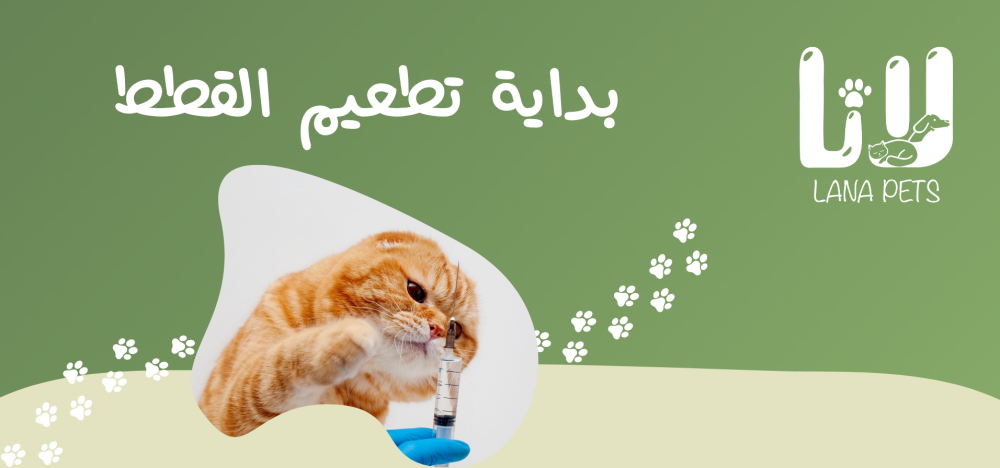
When you welcome a kitten into your home, you welcome a new joy and a life full of adventures and sweet moments. But, as with any new member of the family, comes the responsibility of caring for and protecting them. These little creatures may seem delicate and fragile, but inside they are strength and a desire to explore and learn. To give this journey the best possible start, we must ensure that our new friend is protected from diseases that may threaten their health and life. This is where vaccinations come in, as they are the first step in building a strong fortress that protects them from dangers. So, when do kittens start getting vaccinated? And what steps should be followed to ensure the health and happiness of your kitten? Let's find out together.
Find out when to start kitten vaccinations
Vaccinating kittens is a crucial step in keeping them healthy and safe from infectious and dangerous diseases. Information about the timing and importance of vaccinations can be confusing for some pet owners, so here we will discuss when to start vaccinating kittens and what the benefits are.
When to start vaccinating kittens?
Knowing when to start vaccinating kittens is very important as kittens are usually vaccinated when they reach 6 to 8 weeks of age. At this age, kittens have acquired some natural immunity from their mother's milk, but they gradually begin to lose this immunity, making them susceptible to diseases. Therefore, starting vaccinations at this age helps to bridge the immune gap and protect them effectively.
Basic vaccination schedule for kittens
1. Primary vaccination (at 6-8 weeks):
- Feline Herpesvirus-1 (FVRCP) : This vaccine protects against feline herpesvirus (FHV-1), feline calicivirus (FCV), and feline panleukopenia virus (FPV).
2. Booster doses:
- Booster doses of the triple vaccine are given every 3-4 weeks until the kitten reaches 16-20 weeks of age. This helps to boost immunity and ensure the effectiveness of the vaccination.
Optional vaccinations:
- Feline Leukemia Virus (FeLV) : Recommended for cats that go outdoors or come into contact with other cats.
- Feline Immunodeficiency Virus (FIV) : Requires specific recommendation from your veterinarian based on risk of exposure.
Knowing when to start vaccinating kittens at the right time is one of the most important steps to ensuring the long-term health of your little friend. With vaccinations, your kitten can live a life full of health and happiness.
Learn about cat health care from Lana Pets Store , which contains everything cats need to enjoy your time with them without fear or worry.
The vital role of vaccinations in protecting cats from serious diseases
Cat vaccination is an essential preventive measure that aims to protect cats from a variety of serious and contagious diseases. These diseases can be fatal or cause long-term health complications for cats, so vaccination plays a crucial role in maintaining the health and safety of these beloved pets.
Prevention of infectious diseases
Vaccinations help protect cats from many infectious diseases that can be easily transmitted between animals. These diseases include:
- Feline herpesvirus (FHV-1) : Causes upper respiratory tract infections, which can be life-threatening in some cases.
- Feline Calicivirus (FCV) : Causes ulcers in the mouth and respiratory tract, and can lead to severe pneumonia.
- Feline Panleukopenia Virus (FPV) : Also known as feline plague, this is a highly contagious disease that can be fatal, especially in young cats.
Protection from deadly diseases
Some diseases that vaccines protect against can be fatal if left untreated. These diseases include:
- Rabies : A deadly viral disease that affects the nervous system and can be transmitted to humans. Vaccinating cats against rabies not only protects them but also protects the humans who come into contact with them.
- Feline Leukemia Virus (FeLV) : Weakens the immune system and makes the cat susceptible to other diseases. It can eventually lead to death.
reduce the spread of diseases
Vaccinations also help reduce the spread of disease within cat populations. Cats living in multi-cat environments, such as shelters or multi-cat homes, are more susceptible to infectious diseases. By vaccinating your cats, disease outbreaks can be controlled and the incidence of disease can be reduced.
Strengthening the immune system
Vaccinations stimulate the cat's immune system to produce antibodies that fight disease. This means that if the cat is exposed to the virus in the future, its body will be prepared to deal with it quickly and effectively, reducing the severity of the disease or preventing it altogether.
Save medical costs
Prevention is always better than cure. Treating serious and contagious diseases can be very expensive, involving multiple visits to the vet, costly medical tests, and long-term treatments. Vaccinations provide early protection and reduce the need for these expensive expenses.
The vital role of vaccinations in protecting cats from serious diseases cannot be understated. By adhering to the recommended vaccination schedule and consulting Lana Veterinary Clinic , cat owners can ensure a healthy and long life for their little friends. Vaccinations are a small investment that pays big dividends, providing disease prevention, protecting cats from epidemics, and contributing to the health and safety of both the animal and human community.
Possible side effects of vaccinations and how to deal with them
Now that you know when to start vaccinating kittens, you should also be aware that some side effects may appear after vaccination. It is important for cat owners to be aware of these side effects and how to deal with them to ensure the comfort and safety of their pets.
Common side effects
Idleness
- Description: You may notice that your cat seems less active or feels tired after vaccination.
- Management: This is normal and should improve within 24-48 hours. Make sure your cat gets enough rest.
loss of appetite
- Description: The cat's appetite may be temporarily reduced.
- Management: Offer your cat fresh, enticing food. If loss of appetite persists for more than 48 hours, consult Lana Veterinary Clinic.
Swelling at the injection site
- Description: A small swelling may appear at the injection site.
- Management: Swelling usually goes away within a few days. You can use cold compresses to reduce swelling if needed.
mild fever
- Description: The cat may have a slight fever.
- Management: Make sure the cat has access to water and is kept in a comfortable, quiet place. The temperature should return to normal within 24-48 hours .
How to deal with side effects
- close monitoring
- Monitor your cat closely after vaccination for any changes in behavior or health. Minor changes are often temporary, but any signs of severe distress or allergic reactions should be treated immediately.
Home care
- Make sure your cat is in a quiet, comfortable environment. Offer plenty of water, and encourage her to eat if she has a poor appetite.
Contact Lana Clinic
- If you notice any unusual side effects or if common symptoms persist for more than 48 hours, contact Lana Clinic. Your doctor can provide advice or care.
Additional if necessary.
Reporting medical history
- In the event of an allergic reaction or any serious complications, be sure to inform your veterinarian of your cat's complete medical history and any previous reactions to vaccinations.
While side effects from vaccinations are possible, the preventative benefits they provide far outweigh the risks. Most cats recover quickly from minor side effects. With good monitoring and proper care, cat owners can ensure the safety of their pets and benefit from the protection that vaccinations provide. If you have any concerns, consulting Lana Veterinary Clinic is always the best option to ensure the health and happiness of your cat.
The journey of caring for the health of kittens begins from day one, and one of the most important questions that new cat owners ask is: When do kittens start getting vaccinated? The answer is to start vaccinating kittens between the ages of 6 and 8 weeks to ensure they are protected from infectious and dangerous diseases. Vaccinating kittens at this critical time strengthens their immunity and provides them with a strong health foundation, giving them the opportunity to live a long and happy life.

